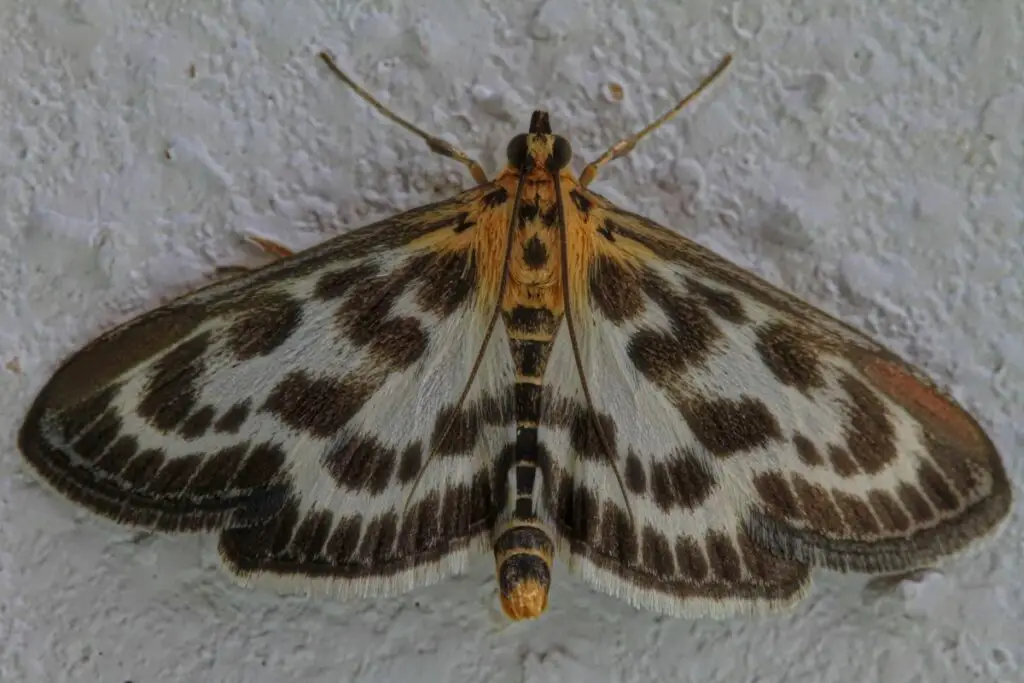Moths have fluttered through the tapestry of mythology and folklore, carving out a niche that often goes unnoticed.
Linked with themes of transformation, the ephemeral, and the mysterious night, these creatures have captivated your ancestors’ imaginations.
In various cultures, deities associated with moths have embodied diverse meanings, from representing feminine energy linked to the moon to symbolizing messages from the spiritual realm or even portents of death.
The soft-winged moth, drawn to the flame, has served as a potent symbol in your mythologies, mirroring deep human emotions and beliefs.
While butterflies often steal the limelight with their bright colors and day-flying habits, moths have their own mythological connections that reflect a unique set of values and stories.
Whether seen as gentle guides or ominous harbingers, moths have woven their way into the fabric of divine stories and spiritual symbolism.
Mythological Origins of Moth Deities
In many cultures, you’ll find deities and supernatural figures connected to the mystique of moths.
These creatures of the night have long held symbolic meaning and have been woven into the fabric of mythology and folklore.
Ancient Greece:
Your exploration might lead you to Psyche, a figure often represented with butterfly wings which symbolize the soul’s travel from life to death.
To the Greeks, moths were symbols of the soul and transformation, with Psyche herself being a poignant representation of these ideas.
Aztec belief:
You would be intrigued to learn about Ītzpāpālōtl, the ‘Obsidian Butterfly.’
An Aztec skeletal warrior goddess who reigns over the paradise of Tamōhuānchān, the mythic land where humans were conceived, she bridges creation, death, and rebirth—domains often attributed to moth iconography.
In your journey through ancient belief systems, you would notice a recurring theme of moths as guides or spirits of the afterlife.
This is rooted in their nocturnal nature and attraction to light, which has led to associations with souls seeking illumination or transcendence.
- Cultural Symbolism:
- Femininity: Moths are often tied to feminine energy, such as the Moon goddess in various mythos.
- Transformation: The metamorphosis of moths from caterpillars resonates with themes of change.
- Guidance: Many myths cast moths as guides of souls on their journey to the afterlife.
By understanding these mythological connections, you can appreciate the profound depth moths hold within the tapestry of human belief.

Prominent Moth Gods in Various Cultures
Moths have intrigued you throughout history, with diverse cultures venerating them through various deities.
Greek Mythology
In Greek tradition, you’ll find the goddess Psyche often represented with butterfly wings, which resemble those of a moth.
These wings symbolize the soul’s journey, reflecting both transformation and the deep connection between Psyche and the moth.
Native American Traditions
Among Native American beliefs, the moth is not commonly associated with a specific god but holds symbolic significance related to change and transformation.
Nevertheless, it’s important to note the reverence for animals and natural phenomena in their stories that could extend to creatures like the moth as spiritual messengers.
Aztec Beliefs
Turning to Aztec mythology, there’s less evidence about deities presiding specifically over moths.
However, the respect for and symbolic meaning ascribed to various animals—insects included—in the Aztec culture often tied them to their gods, viewing them as sacred representations or messengers.
Symbolism and Significance of Moths in Deity Worship
In various cultures, you’ll find that moths are not just insects but carry rich symbolic meaning when connected to divinities.
Your journey into the world of moths in spirituality reveals themes of transformation and the intangible.
- Transformation and Change: Moths undergo a dramatic metamorphosis, embodying the idea of change. Deities associated with moths may represent your capacity for transformation and personal growth.
- Attraction and Desire: Just as moths are drawn to light, they symbolize your spiritual attraction to enlightenment or knowledge. This may be reflected in worship practices where moths represent the soul’s aspiration towards a deity.
- Mysteries of the Night: Being nocturnal creatures, moths are linked to the night and its related concepts. Deities that associate with moths could signify your connection to dreams, the subconscious, or hidden knowledge.
The spiritual symbolism of moths highlights a spectrum of meanings beyond the real-world behavior of these creatures.
They are not merely nocturnal beings fluttering around lights; they epitomize a deeper quest for understanding and association with the divine.
When you encounter moth symbolism in deity worship, be mindful that it reflects a bridge to understanding aspects of the self and the unseen powers of the world.
Whether in myths or modern spiritual practices, moths remind you that there is beauty in the journey towards the light—be it literal or metaphorical.
Rituals and Offerings Associated with Moth Gods
When engaging in rituals to honor the gods associated with moths, it’s essential to understand the significance of this creature within various mythologies.
You’ll find that moths are revered for their symbolism of transformation, mystery, and their connection to the night.
- Moth Flame Divination: In some witchcraft traditions, this practice involves observing the behavior of moths around a flame to gain insights or messages from the spiritual realm. Your interpretation of their dance can guide your decisions and spiritual journey.
- Offerings: Common offerings include:
- Textiles or fabrics symbolizing the moth’s attraction to cloth
- Candles or lamps to represent the moth’s navigation by light
- Sweet liquids like honey or nectar to reflect their feeding habits
- Symbols of transformation, such as cocoon or chrysalis representations
- Creating Altars: By setting up an altar with relevant symbols, you can create a focused space for meditation and connection. Embellish your altar with moth imagery, crystals like moonstone or amethyst, and natural elements to embody the moth’s nocturnal energy.
